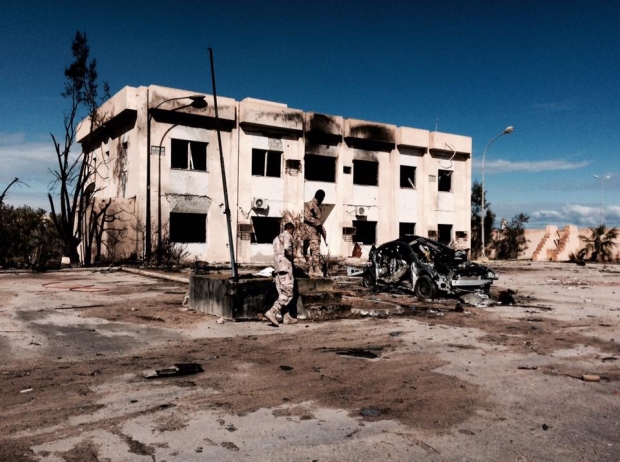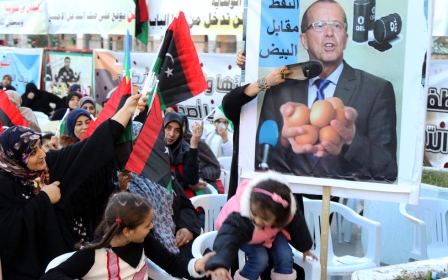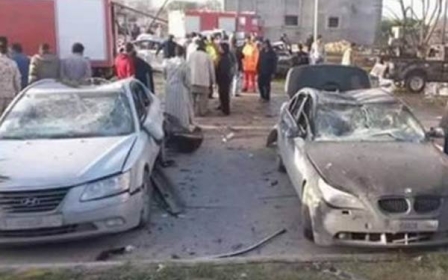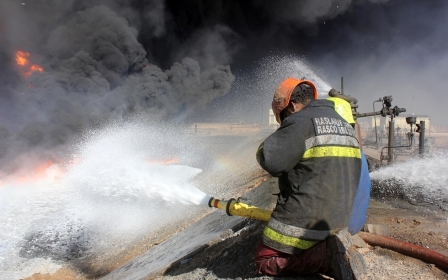Libyans fear military intervention could set country ablaze
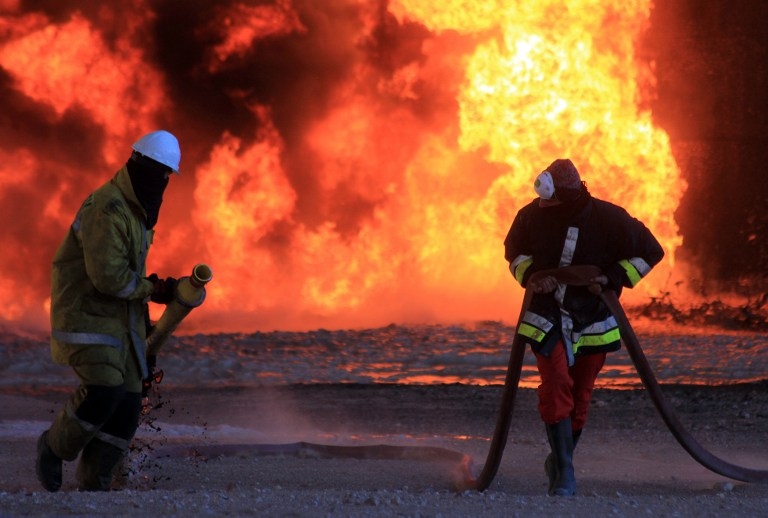
ZLITEN, Libya - Western nations are close to launching an intervention against the Islamic State (IS) group in Libya despite concerns on the ground that further international involvement in the country could make the situation worse, a military spokesperson in the western city of Misrata has told Middle East Eye.
Libya has been rocked in recent weeks by a series of major attacks by IS, including an assault on a police station in Zliten, near Misrata, on 7 January that killed 65 people and injured 100 others.
IS already controls a stretch of coastline around the central city of Sirte, and has launched assaults against Libya’s main oil terminals at Ras Lanuf and Sidra, prompting speculation that the US and its allies could step up their involvement in the fight against a group which they are already bombing in Syria and Iraq.
Libya’s national oil company (NOC) has also called for an intervention to protect strategic areas of the country including the oil terminals.
Ibrahim Bate el Mal, a spokesperson for the Misrata military council, told Middle East Eye that officials were already talking to US, French and Italian military contacts.
“I can only say that the Americans, French and Italians are asking how they can help the Libyans to fight IS and that the operation will not take long. We are close to an intervention," said Bate el Mal.
But Bate el Mal admitted that many people were concerned that military intervention could backfire and may have come too late.
"I think we were wrong to wait so long, probably we have underestimated the danger. I think even the Western governments were wrong,” he said.
“The point is that on the one hand IS’s expansion is out of control, but on the other, the danger is that with a military intervention the situation could only get worse. This is the feeling of our people and of our troops.”
A NATO-led air campaign involving US, French, Italian and British forces was instrumental in helping rebel forces overthrow Libya’s long-term leader Muammar Gaddafi in 2011, but the country has been gripped by instability and unrest ever since.
Air strikes 'not the solution'
Standing in front of the bomb-wrecked facade of Zliten’s police station, Basher Bernani, a member of the municipal council, said that most people were opposed to foreign intervention.
“This situation can no longer be solved by air strikes,” Bernani told MEE.
“They should have intervened earlier, but now ISIS has completely occupied Sirte, there are fundamentalist militiamen in Benghazi, Misrata and Ben Jawal, there are sleeper cells in Tripoli and here in Zliten, and in Sabratha there are two training camps.”
Bernani said locals feared that a foreign intervention could be used as propaganda by IS to create the spectre of a Western takeover of the country, helping them to gain support among young people and drawing sympathetic fighters from Tunisia, Morocco and Algeria and other countries via Libya’s porous borders.
"European [military action] is likely to make the situation worse and bring dozens of foreign fighters here,” he said.
Since IS announced its presence in Zliten on 7 January by bombing the police station as 300 recruits were training in the square outside, officials such as Bernani have required constant armed protection to move around the town.
Walking through the remains of the square, he pointed out pieces of shrapnel from the truck bomb, which was packed with pieces of iron and sharp blades to cause maximum casualties.
“We found arms and legs of our guys on the third floor of the dormitories,” he said.
“Twelve families lost their sons and they cannot mourn them because their bodies are unidentifiable.”
Bersani said investigators believed IS may have targeted the police station because of its links to the Libyan Coast Guard, which also used the facility as a recruitment and training centre.
He said Zliten was an important hub for people attempting to cross the Mediterranean to Europe, and that IS seemed to have established links with other militia groups involved in people smuggling as a means of raising revenues.
“It is now increasingly clear that IS are involved in human smuggling which guarantees them a large amount of cash,” he said.
Other officials said the attack on Zliten was also important because it demonstrated IS’s presence in the coastal area between Tripoli and Misrata, and that it has the means and men to mount attacks everywhere in Libya.
'The only real winner is IS'
Mustafa Ben Aish, another member of Zliten’s council and the director of the emergency unit that responded to the police station attack, told MEE that IS stood to gain from the power struggle in Libya between rival governments in Tripoli and Tobruk.
That situation was further complicated this month by the announcement of the formation of a UN-backed national government rejected by many members of both of Libya’s competing parliaments.
On Wednesday, Martin Kobler, the UN envoy to Libya, conceded that the political peace process was moving too slowly to keep up with IS’s expansion and accused the group of “stealing territory from the Libyan people”.
“The only real winner is IS, and the destruction of the barracks is the proof," said Ben Aish, taking out a sheet of paper and showing MEE a partial list of the dead and injured.
“The most seriously injured were evacuated to foreign countries. Fifteen are in Italy, about 20 in Turkey, some of them are in critical conditions and every time I get a call from their families I think that instead of those guys it could be my son. This is very painful for me,” he said.
IS followed up the bombing on Zliten by launching attacks against the oil terminals at Ras Lanuf and Sidra, leaving at least 37 people dead, setting fire to half a dozen fuel storage tanks, and dealing a further crippling blow to Libya’s already beleaguered oil industry.
IS crippling oil sector
Before the 2011 revolution, Libya was producing 1.6mn barrels of crude per day, but today production has fallen to less than 350,000 barrels daily and IS attacks have further heightened concerns about the collapse of the industry.
For IS, the goal appears not to be selling oil, as it has done in Syria and Iraq, but rather to sabotage the economy, making Libya even more unstable and taking advantage of the power vacuum to extend its influence.
Bate el Mal told MEE that military intelligence chiefs feared that a possible intervention could further destabilise the country, with IS fighters from Syria and Iraq and elsewhere heeding the call to defend the territory of the self-declared caliphate.
He said that fighters from Sudan, Tunisia, Egypt, Algeria and Yemen were already gathering in Sirte, and suggested that Gaddafi loyalists motivated by revenge were also backing the group in the former leader’s home city, as supporters of Saddam Hussein have been accused of supporting IS in Iraq.
“We see happening here what has already happened in Iraq with the Baath party,” he said.
"Libyans are still paying for the consequences of the revolution. They are not ready for another war, yet now their children are dying at the hands of IS. All they want is to destroy the country.”
New MEE newsletter: Jerusalem Dispatch
Sign up to get the latest insights and analysis on Israel-Palestine, alongside Turkey Unpacked and other MEE newsletters
Middle East Eye delivers independent and unrivalled coverage and analysis of the Middle East, North Africa and beyond. To learn more about republishing this content and the associated fees, please fill out this form. More about MEE can be found here.


